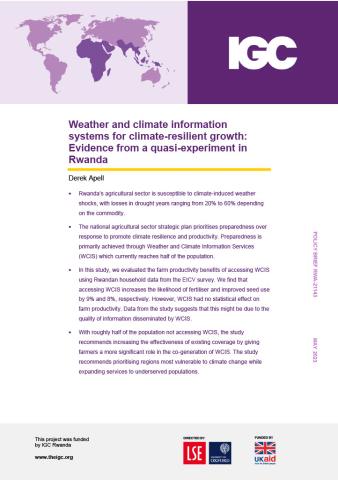-
Policy brief Apell May 2023.pdf
PDF document • 303.13 KB
- Rwanda’s agricultural sector is susceptible to climate-induced weather shocks, with losses in drought years ranging from 20% to 60% depending on the commodity.
- The national agricultural sector strategic plan prioritises preparedness over response to promote climate resilience and productivity. Preparedness is primarily achieved through Weather and Climate Information Services (WCIS) which currently reaches half of the population.
- In this study, we evaluated the farm productivity benefits of accessing WCIS using Rwandan household data from the EICV survey. We find that accessing WCIS increases the likelihood of fertiliser and improved seed use by 9% and 8%, respectively. However, WCIS had no statistical effect on farm productivity. Data from the study suggests that this might be due to the quality of information disseminated by WCIS.
- With roughly half of the population not accessing WCIS, the study recommends increasing the effectiveness of existing coverage by giving farmers a more significant role in the co-generation of WCIS. The study recommends prioritising regions most vulnerable to climate change while expanding services to underserved populations.


